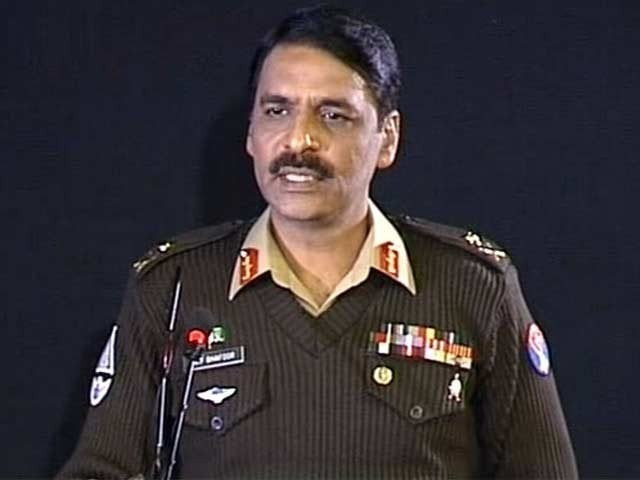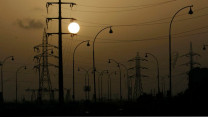Army hopes Kabul will focus on TTP, Da’ish after restoration of peace
Pakistan wishes for the success of ongoing peace dialogue between Afghan Taliban and US: DG ISPR

Pakistani security officials have long said that the outlawed terrorist groups – especially the Tehreek-e-Taliban Pakistan and the Khorasan franchise of Islamic State, also known by its Arabic acronym Da’ish – orchestrate and mount attacks in Pakistan from their sanctuaries in Afghanistan’s border regions.
Most deadly terrorist attacks in Pakistan have been traced to eastern Afghanistan, where the TTP and Da’ish maintain safe havens in the areas where Kabul has no writ.
In a first, Taliban, US publicly admit ‘progress on vital issues’ in talks
“We hope that after the war ends [as a result of the ongoing reconciliation process] Afghanistan will be able to focus on groups like the TTP and Da’ish, which carry out attacks in Pakistan. Afghanistan should then focus on eliminating these threats to Pakistan,” the chief military spokesperson, Major General Asif Ghafoor, said in an exclusive interview with The Express Tribune on Sunday.
سرحد کے اُس پار افغانستان میں جاری امن مذاکرات کو کیسے دیکھتے ہیں؟@rehman_azhar
— Center Stage Videos (@CS_Videos) January 27, 2019
ظاہر ہے اگر افغانستان میں امن آجاتا ہے تو پاکستان کو بھی اسکا فائدہ ہوگا@OfficialDGISPR #AfghanPeaceTalks pic.twitter.com/BvuiSOS5G9
He said Pakistan wished for the success of the reconciliation process. “Pakistan is relatively peaceful but if your neighbourhood is disturbed, it will have an impact on you,” said Maj-Gen Ghafoor, the director general of the Inter-Services Public Relations (ISPR).
Before the fence had been erected, terrorist groups used to take advantage of the porous border between Pakistan and Afghanistan and sneaked in to carry out attacks on Pakistani border posts and villages, he said.
“Our area is under control now but the Afghans don’t have control on their side, which is why the Chief of Army Staff (COAS) came up with the idea of fencing the border,” the military spokesperson said. “The fence has made it difficult for terrorists to cross the border. It has stopped cross-border terrorism and physical attacks are coming to an end.”
Pakistan deserves credit for US-Taliban peace talks: FM Qureshi
Last year, the military said that it would complete fencing the 2,611 kilometres long border by the end of 2019 at a cost of $550 million. The pair of nine-foot wire fences, with a six-foot gap, and topped with barbed wire, runs along rugged terrain and snow-capped mountains as high as 12,000 feet.
افغان بارڈر پر باڑ لگانے کا پاکستان کو کیا فائدہ ہوا، سنئے ڈی جی آئی ایس پی آر میجر جنرل آصف غفور کی رحمان اظہر سے خصوصی گفتگو@OfficialDGISPR @rehman_azhar pic.twitter.com/UsUmFZWoE4
— Center Stage Videos (@CS_Videos) January 27, 2019
Maj-Gen Ghafoor also spoke about the concerns voiced by the Pashtun Tahafuz Movement (PTM). “Wherever [military] operations take place, people see pain and suffering [as a collateral consequence]. A war has been ongoing [in Pakistan] for the last 20 years,” he added. “If a kid is 20-year old today, he has only seen war in his lifetime.”
The military spokesperson said that in the post conflict environment it was the state responsibility to assuage the genuine grievances of people, “but you cannot take matters of the state in your own hands”.
He added, “Whatever the problems, they are to be solved here locally as you have to live here. These problems cannot be solved in Karachi or outside the country. If you are interested in finding a solution, talk to the local leadership and the army.”
Pakistan closes consulate in Mazar-e-Sharif after terror bid foiled: FO
The PTM has been staging rallies and public meetings in different cities of the country to rally support for its demands, though some of them have already been addressed.
“It is the responsibility of the state and also our responsibility as an instrument of the state to solve these issues. There are genuine concerns that need to be addressed. But the solution has to be found through talks not somewhere else.”
When asked about the merger of FATA with Khyber-Pakhtunkhwa, Maj-Gen Ghafoor said that being a Pakistani, he was very happy to see FATA becoming part of Pakistan. “These areas [FATA] were known as ‘no-go areas’,” he added. “The merger would bring dividends for the tribal population in terms of health and education facilities.”
Pakistan to benefit from ‘successful’ US-Taliban peace talks: Fawad
Earlier, tribal people relied on the Jirga system for the resolution of their disputes. Now police will work in these areas as they do elsewhere in the country. And this would bring a feeling among the tribal people that they are equal citizens of Pakistan.
فاٹا کے علاقوں کو 25ویں آئینی ترمیم کے بعد پاکستان کا حصہ بننے کو پاک فوج کتنی بڑی کامیابی سمجھتی ہے؟@rehman_azhar
— Center Stage Videos (@CS_Videos) January 27, 2019
ڈی جی آئی ایس پی آر میجر جنرل آصف غفور نے کہا فوج خصوصاً مقامی افراد بہت خوش ہیں کہ جو علاقے 70 سال سے علاقہ غیر کہلاتے تھے اب پاکستان کہلائیں گے@OfficialDGISPR pic.twitter.com/rdOO84m684
The military spokesperson said that the control of entry and exit points of North Waziristan district have been handed over to the civil administration. “When police come, the law and order situation would also improve,” he added. “Our purpose was to ‘clear, hold, build and transfer.’”
He added that the military was holding the region after purging it of terrorists. Currently, the region is being rebuilt with the help of state institutions and donors, he added. “The locals will enjoy the peace dividends after the transfer phase.”
The military spokesperson called upon the locals to extend full cooperation to the local administration in order to further strengthen it.



















COMMENTS
Comments are moderated and generally will be posted if they are on-topic and not abusive.
For more information, please see our Comments FAQ